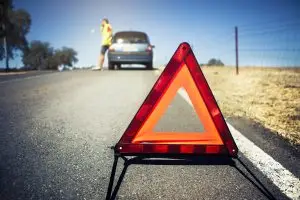
When police see you in a vehicle and believe that you’re drunk, their natural reaction is to arrest you for DUI. But how can you be convicted of driving under the influence if you never actually drove the car?
The answer is, you can’t. California law is very clear that to be convicted of DUI, you must have been driving the vehicle. In some Los Angeles DUI cases this is a very successful defense—it can be enough to win your case. But, you have to understand what counts as “driving” under California law and what evidence you need in court.
What Counts as Driving in California
Section 2241 of the California Criminal Code defines what it means to drive:
“A person drives a vehicle when he or she intentionally causes it to move by exercising actual physical control over it. The person must cause the vehicle to move, but the movement may be slight.”
What this boils down to is: if you voluntarily made a vehicle move, you were driving that vehicle.
Obviously, this definition encompasses a lot of things we don’t really think of as driving. Moving a car from one parking spot to another is driving, and so is backing it up the driveway. Other examples of driving include:
- Steering for someone else. Imagine your sober friend is driving you home. The car is too warm and they say they need to take off their sweater. They ask you to hold the wheel while they do so. You are now “driving” because you control the movement of the vehicle. If you swerve and the police pull your friend over, you could be arrested for DUI.
- “Rolling” with the engine off (or in neutral). You’re getting ready for a house party and you’ve already had a few drinks. Suddenly you remember you need to move your car so there is space in the driveway for guests. You never even put it in drive—you just let it roll down the driveway to a better position. An officer observes this and sees you stumble when you get out. They have grounds for a DUI arrest.
- Barely moving a car. You leave a bar, get in your car, and think about driving home. As you start to pull out of the parking spot you realize you’re intoxicated. You stop, planning to call a friend. That’s when the squad car lights go off behind you. You didn’t move the car more than two feet—but it’s a DUI.
These rules apply to any vehicle. You can even get a DUI for driving a lawnmower.
But there are also many situations that don’t count as driving. These include:
- You only sat in the driver’s seat. The car never moved.
- You started the car but never moved it. Running the engine does not count as driving.
- The movement was not under your control. Theoretically, if you were “sleeping it off” in a parked car and accidentally popped it in gear in your sleep, you weren’t driving. You did not voluntarily cause the car to move.
Proving that You Drove
In a DUI case, you don’t have to prove that you weren’t the driver. The burden of proof is on the prosecution. If you say you weren’t driving, they have to prove otherwise.
To prove their case they’ll try to find evidence. The most common evidence is an admission of guilt from you, the defendant. If you admitted to police that you were driving, even if you were confused when you said it, it’s very hard to take back. But a good DUI lawyer may be able to block this evidence if your rights were violated.
Another common form of evidence is a statement by the police officer. This is not really proof, because it depends on the officer’s honesty and memory. But police officers are generally seen as respectable by the court. If the officer says you were driving, your DUI attorney will look for inconsistencies in their statement—when did they arrive at the scene? When did they first see you at the wheel? Have they forgotten or misconstrued other facts in their report?
Sometimes the prosecution has no direct evidence that you were driving. They will still try to convict you. Their argument essentially boils down to: who else could have driven the car? If you were found in your car at an accident scene, and no one else was in the car, the court will assume you drove it, even if you say otherwise.
The key to a “no driving” defense is to create reasonable doubt. As long as the jury isn’t sure you were driving, you should be acquitted.
Getting Your DUI Charge Dropped
Making a No Driving defense work in a DUI case is hard without legal expertise. You need an attorney who understands what evidence the prosecution will use and how they’ll respond to your defense in court. A good DUI attorney may be able to get you acquitted if you weren’t driving, or even get the charge dropped without a trial. But if you have no lawyer and you say you weren’t driving, you are easy pickings for the prosecution.
You deserve a real defense. Let us match you with an experienced Los Angeles DUI attorney. Your attorney will give you a 100% FREE case evaluation and advise you of how your case will likely play out. Simply fill out the form to the right and get your free evaluation today.






